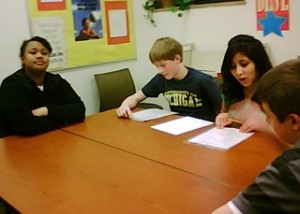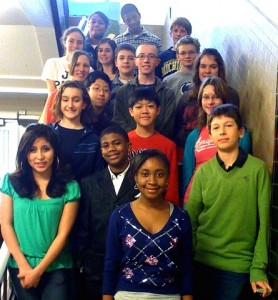• Positive Peer Influence group has a long history at Pioneer
By Casey Hans
AAPSNews Service
The roles are set: Two Slauson Middle School students are peer mediators; two others play a boyfriend and girlfriend in a dispute from an off-site party that has carried over to school.
The “boyfriend” has apparently flirted with another girl.

Tempers flare and accusations fly, but eighth-grade conflict managers Lalita Ramirez-Lopez and Evan Shambaugh hold to their rules. They follow a script and procedure they’ve been taught through Peers Making Peace – a new program at the Ann Arbor middle school this year.
“No interrupting,” says Evan firmly, putting an arm out toward Alina Frye, who is beginning to speak directly to her “boyfriend,” played by Mason Kupina. “Don’t talk to him.”
The students must communicate via the peer mediators. They use questions such as “would you like to add anything?” and “what do you need to feel OK about this situation?” and “what can you do to solve this problem?”
“It’s good to get everybody in an opportunity to solve a conflict,” said Evan after the exercise. “It makes sure they listen to the other person.”
The program is gaining ground in Ann Arbor secondary schools, empowering students to help peers resolve their own disputes and keep potential problems from escalating into larger issues.

Pioneer High School adopted it in 2007 and four other Ann Arbor schools trained in the program this year including Slauson, Skyline High School and alternative programs at Stone High School and the Roberto Clemente Student Development Center, said Kenzi Bisbing, youth services manager for the Oakland Mediation Center who oversees the program that serves more than a dozen schools in southeast Michigan.
Bisbing said the program is “for students, by students. Our ultimate vision is that will be at every, single grade level.”
The program is funded through a Title IV Safe and Drug Free Schools federal grant, so districts pay no money for training.
The program not only equips students with skills to resolve disputes, but also reduces staff time spent on discipline and improves school climate, according to program information. Research shared by the OMC shows that schools using the national program have generated a 75 percent drop in expulsions, a 90 percent drop in assaults and a 57.7 percent drop in discipline referrals.
Stone, Clemente and Slauson have trained students and Skyline is scheduled to train students in April, Bisbing said. A three-day trainer workshop was conducted in Ann Arbor last fall for staff who, in turn, train students and put the team in place. Training includes the principles behind mediation and communication and problem-solving skills, as well as team-building exercises.
Slauson teacher Donna McVey and counselors Jan Mackenzie and Grace Harbison are program advisers. They say it should make the established program at Pioneer and the new one at Skyline stronger as students move into high school.
“Conflicts are like an onion. Layers and layers of things may have taken place at earlier times,” explained McVey. “You see them (students) in a bad mood, you check in. If you do see them going at it again, you can pull them right in.”
McVey said students are generally comfortable being part of it. “We talk about the school as a community,” she said. “They love that they can talk to someone and it’s private. Whatever happens in the room stays in the room.”
Slauson Principal Chris Curtis is pleased with it. “I think it’s a terrific program,” he said. “I’m very supportive of it. It empowers the students. The district has done similar things, but this has been a more organized and thorough approach.”
At Stone High School, counselor Madeline Davis works both with the Positive Peer Influence class – designed to help students with challenges that may interfere with their academics – and the new Peers Making Peace.
Fourteen Stone students were trained in PMP in conjunction with several students from Roberto Clemente, where community liaison Barbara Malcom coordinates the program.
“All of my leaders are good students and keep up their grades; that’s a requirement of the program,” Davis said. “We’ve had some referrals already.” She said her PMP leaders are ” in the know, so they come to me. That’s what I’m so proud of. They’re able to maintain relationships (within school) but stand out as leaders.”
Davis said Pioneer counselors Evelyn Tolson and Sara Vance approached Davis about implementing it at Stone. “I went (to training) and the rest is history,” she said. “I love that students are empowered. I think the students are relieved that there’s a place to come to resolve issues. They don’t want to fight.”
Stone senior Nate Graulich is a trained conflict manager and has handled two situations so far. “It gives the kids a chance to talk about things instead of fighting and leaving school,” he said. Graulich said often the student leaders check in informally with fellow students following a PMP session, after which students have signed an agreement about how to proceed. “They know they’re accountable,” he added.
“I see (the program) growing and getting bigger,” said Davis, noting that she is hearing students use some of their skills in everyday conversation around school. “It’s something we’re committed to. It will all contribute to the positive culture we’re trying to create an maintain.”
The Oakland Mediation Center is the only entity credentialed in Michigan to train school staff in the Peers Making Peace program. Visit www.mediation-omc.org for information.
Casey Hans edits this newsletter for The Ann Arbor Public Schools. E-mail her at or call 734-994-5090 ext. 51228.


1 Trackback / Pingback
Comments are closed.